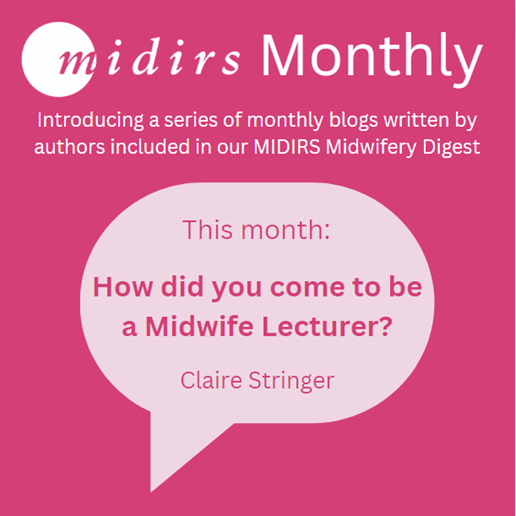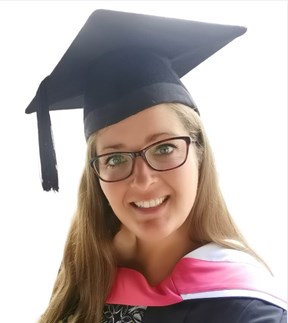MIDIRS Monthly - How did you come to be a Midwife lecturer?
By Claire Stringer on 01 February 2024

When asked the question, “How did you come to be a Midwife Lecturer?”, this is always how the conversation starts: At 18 years old when trying to decide on my choice of career, I had a realisation that I could be a Midwife and dabble in teaching but I couldn’t be a Teacher and dabble in midwifery. I knew that imparting knowledge, motivating and inspiring people was something that came naturally to me and in turn this motivated and inspired me. However, I had a deep-rooted empathy and compassion to care for others and the NHS was the most obvious place to do this. I looked into studying medicine but overwhelmingly I knew I wanted a career where I could really develop relationships and that, coupled with the autonomy of the midwifery profession, was a driving force in my decision to train to be a Midwife.
In September 2005 at 18 years old, fresh out of school, I began studying for my Midwifery Diploma at Kingston University and St. Georges Medical School, London. What I will say to start with is that I had to grow up very quickly. I was overwhelmed by the enormity of the responsibility and immediately passionate about the miracle of pregnancy and birth. The three years of training were and will always be a highlight for me. As my knowledge and confidence increased, I grew even more in awe of what a privilege it was to be a Midwife. In Sept 2008 I qualified as a Midwife with a Diploma and within the first year of qualification I continued to study to graduate with a BSc Honours in Midwifery. It was clear at the time that Midwifery was soon to become an all degree profession and it would be beneficial to my continuous professional development (CPD) to also gain this qualification.
I had become aware during my training that I found great joy in teaching junior students. Therefore, following on from the completion of the BSc in Midwifery. I began the Mentorship for Practice course (NMC Stage 2). I continued to find great satisfaction in mentoring students and guiding their development throughout their training. Throughout my time as a clinical midwife I worked in a variety of settings: community midwifery; labour ward; antenatal and postnatal wards; rotational community and birth centre; birth centre; infant feeding; risk management.
I spent 12 years of my career in one trust but very soon, with a young family, I was priced out of the London housing market and made the move to Buckinghamshire. I began working as birth centre midwife in a stand alone and an alongside birth centre. I was approached within a few months and was asked if I would consider a move to clinical education. I wasn’t quite ready to leave clinical care at this point but kept the thought in my mind. I completed the Newborn Life Support course with Resuscitation Council UK and was invited to train as an instructor. I remember feeling immense pride, the feeling that someone had recognised my passion for teaching. I completed my instructor training and teach newborn life support on a regular basis with NHS Trusts.
In 2019 I applied and got accepted for the role of practice development midwife. This was a swift drop in patient contact and there were personal challenges with that. However, the importance of CPD for NHS staff became a passion for me. Within this time, I completed a course to become a Human Factors trainer with Global Air Aviation. Human Factors soon became a driving force within my role. I championed teamwork, civility and kindness to improve morale and patient experience. I was privileged to work alongside an inspiring midwife in practice development. She taught me many things about education and disseminating information. She constantly allowed me to develop as an independent learner within my career, teaching me to allow people to learn more effectively by seeking answers to their questions rather than just being given the answers. She showed me how to break down barriers and aim high, she saw obstacles and rationally sought to solve them. As team we noticed a sizeable shift in engagement from staff in their CPD and saw a love of learning return. There are people you meet in your career who are sources of inspiration, she is and will always be one of those people for me.
Whilst within this role, I read a paper on how to instil change in the NHS. As I read, many things resonated with where I hope the NHS will be in the future and the impact that has on me as an Educator. I wanted postgraduate training to be something the learners were committed to not just compliant with. In postgraduate education, the focus is on updating skills, knowledge and research, in line with the ever changing and modernising health service. However, if we want to see changes in practice, then we need to speak to the people who are clinically responsible for those tasks. If we can use their experience and ideas and listen to their voices, then we can make changes that keep patient safety at the heart of training. I learnt that everyday action and thinking was imperative; change will not happen on just an annual update, it needs to be a task of daily feeding, small steps every day leading to breakthrough. A challenge I set for myself was: If you can change how people think and make sense of things for them daily, it will impact how they act and the results they achieve. In turn this will make positive changes within the organisation. People are the targets for real action and if we can encourage new thinking and a conviction to change, the NHS in which they work will thrive. Irrespective of what the topic is that I was teaching, the power behind making changes happen, was how I engaged the learner. As an educator, this meant listening to them and grappling with their experiences. Most importantly, it was using their tacit knowledge, valuing their experiences and inspiring them to be the change that leads to better outcomes in maternity care. I was keen to learn more about education and develop my skills so I completed in 2020, a Postgraduate Certificate in Medical Education. My interest in simulation as a teaching tool grew from here. I have since published a paper regarding fidelity in simulation (Stringer, C. (2023) An integrative review of the impact of fidelity on simulation-based learning in midwifery education. MIDIRS Midwifery Digest, 33(4), pp.321-325). What I haven’t yet mentioned is that a hobby of mine is performing arts, I realised that this came in handy when promoting simulation based learning!
In 2021, a Midwife Lecturer role was advertised with a local university. Midwifery staffing was at an all time low and I saw an opportunity to develop from the outset, compassionate, knowledgeable, autonomous midwives. I applied for the job and have spent the last few years in this role. This career move was a huge learning curve. I went from being an expert in my field of midwifery to a novice in academia. I am still learning on the job but have found the satisfaction of the role immensely pleasing. Although daily life is a juggle, working full time with three wonderful but exhausting children, I valued the importance of furthering my knowledge in education. I continued my journey by studying for a Master’s in Education and was welcomed into the world of research and writing for publication. This is where you will currently find me, knee deep in my role as a researcher alongside my lecturing responsibilities! My field of research is decolonising of midwifery curriculums. I am committed to contributing to the research portfolio regarding equity of education for global ethnic majority student midwives and advancing social justice.
Although my responsibilities have changed, my passion to develop relationships and to inspire and motivate others, is still very much alive in my role as a Lecturer. Being entrusted with the education of another person is a responsibility I hold in high regard and am privileged to undertake.

